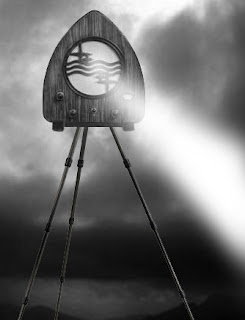 This coming Halloween will mark the 70th anniversary of Orson Welles' radio-vérité broadcast of "War of the Worlds." Radiolab just posted an outstanding podcast of the "War of the Wolds" legacy. Why did it fool people then? And why does it continue to fool people?
This coming Halloween will mark the 70th anniversary of Orson Welles' radio-vérité broadcast of "War of the Worlds." Radiolab just posted an outstanding podcast of the "War of the Wolds" legacy. Why did it fool people then? And why does it continue to fool people?
First they look at the context of the times -- the recent destruction of the Hindenberg and the new media form of the day which is now part of our mental furniture. It starts, "We interrupt this program..." As Hitler continued his attacks throughout Europe, special bulletins became an authoritative and attention-getting feature of radio -- a feature Welles exploited. Tellingly, many of the listener's fooled by Welles' broadcast believed that it was Germans attacking, rather than Martians.
Other radio stations have staged their own versions of "War of the Worlds" over the years. And again people were fooled. The most disastrous example is the profoundly ill-advised broadcast in the capital city of Ecuador, Quito. The Quito broadcast was produced without any warning to anyone. In fact, the producer planted fictitious stories of strange phenomena in the days preceding the broadcast -- to whip up paranoia. At the end of the evening, the radio station was set on fire by an angry mob. Six people died that night.
Buffalo's WKBW (my hometown and my favorite station in the 70's) first broadcast "War of the Worlds" in 1968 -- modernized and set in the Western New York landscape. The 1971 WKBW broadcast is available online. The page contains a link to the full show (with great opening music) plus a making-of video. The climax of the '71 broadcast has iconic TV news anchor Irv Weinstein reporting from a rooftop like Edward R. Murrow. Except Irv is reporting on an approaching robot. It's really quite brilliant.
Tuesday, March 25, 2008
The Legacy of War of the Worlds
Labels:
Hoaxes,
psychology,
Radiolab
Subscribe to:
Post Comments (Atom)

No comments:
Post a Comment